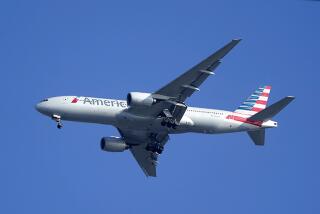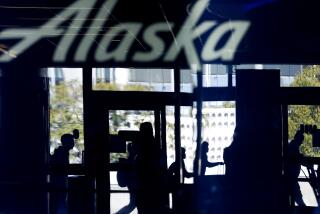What to do when your flight is delayed or canceled
- Share via
You’ve probably been there: You are in a rush to get home, and your flight is delayed or canceled. What to do? Buy a new ticket? Before you spend the money, here are some things to know.
Before 1978, U.S. airlines that faced a delay or flight cancellation were required to offer transportation on a competitor’s next flight if that flight would get the passenger to their destination sooner. Airlines were even required to put economy-class passengers in first class if only first class was available.
This rule, called Rule 240, was mandated by the now-defunct Civil Aeronautics Board and was incorporated in all airlines’ contracts of carriage. The only exception was for force majeure — an “act of God” — which each airline could define.
Most airlines have eliminated Rule 240 from their contracts. But here’s what you’ll learn from this Guide to Air-Passenger Rights at bit.ly/1sOrf1t by Airfarewatchdog.com (which I founded): At least three carriers still have Rule 240: Alaska, Frontier and United.
Alaska has language about putting passengers in an upgraded class of service if that’s all that’s available. (Frontier and United do not.)
Of course, all this assumes that there is a seat on another airline that will get you where you’re going faster than your canceled or delayed flight. With load factors — how many seats are full — high these days (83.4% full, an all-time high for April, the most current month available, according to the Bureau of Transportation Statistics), that’s not a certainty.
Few people would sit down and read an airline’s contract of carriage, but it could be a huge help if you’re stuck. You can see Alaska’s contract at bit.ly/1qBmsuY. (Search for Rule 240, and it should pop up on Page 46.)
Frontier’s is here: bit.ly/1jJGvJk. (Scroll down to page 31.)
And United’s: bit.ly/IEWpCw. (Scroll down to Rule 24, page 33, especially subparagraph E.) Note United’s extensive definition of force majeure events, including a “shortage of labor” (which presumably includes crew not showing up for your flight because their inbound flight was late).
To see how other airlines define “passenger rights,” consult that guide at bit.ly/1sOrf1t.
Here, for example, you’ll find that American Airlines says this: “American will attempt to reroute the traveler on the next flight with available seats. If American does not get the traveler to his or her final destination on the expected arrival day, the airlines will provide reasonable overnight accommodations, subject to availability.
“If your originally scheduled flight was canceled and you decide not to travel, you can receive a full refund.”
Nary a whisper of Rule 240.
Southwest has a slightly different take on this. It doesn’t say that it will find you a place to stay if you’re delayed “subject to availability”; it says it will do that and it will be as near as possible. Here’s how it reads: “If, for any reason, your Southwest flight does not operate as scheduled, Southwest will, at the customer’s request, refund the unused portion of your fare or will assist you by arranging to transport you to your destination on another Southwest flight with available seats. If the passenger elects to take an alternate Southwest flight, he or she will not be charged any more money even if the ticket for the disrupted flight has usage limits or fare restrictions.
“If circumstances within the airlines control cause a customer to miss the last possible flight or connection of the day to his or her destination, Southwest’s customer-service agents have the authority to arrange for overnight lodging for that customer and will find the customer a hotel or motel as near to the airport as possible, at no additional cost. Customer service may also arrange for ground transportation to the overnight facility.”
And keep in mind that even if an airline has rid itself of Rule 240, it doesn’t hurt to ask. (Be aware the younger airline employees may not know what Rule 240 is.)
Airlines, when it suits them, routinely put passengers on competitors if there’s space available.
It’s up to the discretion of employees, so you should always ask as humbly and sweetly as humanly possible.
More to Read
Sign up for The Wild
We’ll help you find the best places to hike, bike and run, as well as the perfect silent spots for meditation and yoga.
You may occasionally receive promotional content from the Los Angeles Times.






